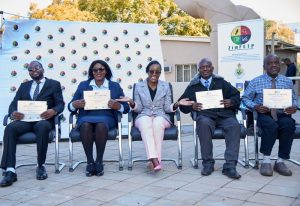Strengthening Healthcare Systems in South Sudan: A Collaborative Effort
The United States Centers for Disease Control and Prevention (CDC) and the African Field Epidemiology Network (AFENET) have joined forces under the AFENET Networking Cooperative Agreement, funded by the CDC, to bolster healthcare initiatives in South Sudan. One of the primary focuses of this collaboration is the enhancement of HIV/AIDS and tuberculosis (TB) health information systems.
Key Projects: AFENET is leading three critical projects as part of this initiative:
- HIV HSS & Workforce Development Project: Launched in October 2023, this project aims to elevate the quality of HIV/TB services and establish a secure National Health Information System (HIS) across five PEPFAR-supported states.
- South Sudan FETP Program: This program empowers frontline healthcare workers through the Field Epidemiology Training Program (FETP), ensuring a skilled workforce for effective disease surveillance and response.
- DHIS2 COVID Vaccination Data Management Project: In response to the global pandemic, this project focuses on efficient data management for COVID-19 vaccination efforts, utilizing the District Health Information System 2 (DHIS2) platform.
Strategic Approaches: AFENET has adopted four strategic approaches to achieve project objectives:
Providing technical support and coordination to strengthen health systems.
Enhancing Monitoring and Evaluation (M&E) of national health programs, with a specific focus on HIV/TB.
Supporting the planning and coordination of community-based HIV prevention activities.
Developing human resources for health skills through innovative platforms like Project ECHO.
Recent Developments: Dr. Kayita Godfrey, Senior Epidemiologist and Project Coordinator, recently visited South Sudan to oversee project activities and foster collaboration among stakeholders. His visit included:
- Strategic meetings with AFENET and CDC teams to assess progress and plan future endeavors.
- Engagements with the Ministry of Health and other partners to synchronize efforts and optimize resource utilization.
- Participation in the Community HIV/AIDS stakeholder reset meeting to streamline interventions and foster collaboration.
Community Engagement: Recognizing the vital role of community involvement, concerted efforts have been made to:
- Define a minimum community service package for HIV/AIDS interventions.
- Identify and engage key community gatekeepers to facilitate program implementation.
- Address the specific needs of vulnerable groups such as men, female sex workers, youth, and uniformed forces.
- Foster collaboration with stakeholders like the Global Fund and UN agencies to maximize resources and minimize duplication.
- Establish HIV/AIDS support groups at the grassroots level to enhance community participation and support.
Conclusion: As we continue our journey to strengthen South Sudan’s healthcare systems, collaboration, innovation, and community engagement remain paramount. Together, we are committed to creating a healthier and more resilient future for all citizens. Join us in our mission to combat HIV/AIDS and TB and build a brighter tomorrow for South Sudan.




